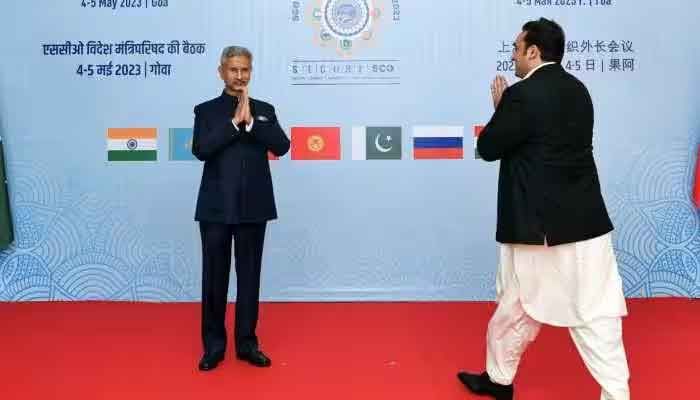
On Thursday night when Foreign Minister Bilawal Bhutto-Zardari entered the venue of cultural event and a dinner at a 7-star resort, he was greeted by his Indian counterpart.
The event was kept from the media watch. Only a handful of officials were allowed to accompany their respective heads of delegates. Foreign ministers of the eight-nation Shanghai Cooperation Organisation (SCO) sat on the same table, enjoyed the food and had informal chit-chat. Bilawal and Indian Foreign Minister Jai Shankar too interacted.
The atmosphere was "cordial" and "positive," according to one of the members of the Pakistani delegation who was with FM Bilawal.
The first day of Bilawal in Goa and the way the Indian side treated the Pakistani delegation rekindled some hope that if there was no breakthrough, at least there won't be further deterioration in ties.
Read more: Onus on India to create 'conducive environment' for talks: Bilawal
Then came Friday the day of the meeting of the Council of Foreign Ministers of SCO. Media was not given direct access to the hotel where the conference was taking place. They were provided live feed at a media centre established for journalists covering the SCO.
When foreign ministers started arriving at the venue, the Indian foreign minister was there to greet the heads of SCO delegations. Everyone in the media centre full of Indian as well as international journalists including from Pakistan were glued to the big screen to know how Jai Shankar was going to receive Bilawal.
But by that time it was already known that there won't be a handshake as Jai Shankar greeted the foreign ministers before Bilawal with the Indian traditional style of "Namstay".
Read: What to expect of Bilawal’s India visit?
Was it a deliberate move by the Indian FM to avoid being seen as shaking hands with Bilawal on camera? Some Indian journalists there didn't rule out the possibility.
But they were not surprised given that the BJP government didn't want to give any optics that would have undermined its narrative before the state elections in Karnataka.
Bilawal, nevertheless, had no complaints. He was fine with the way Jai Shankar greeted him. In fact, he said this was how people in Sindh greet each other.
The next big curiosity was the speech of Jai Shankar. There were debates in the media hall and guessing games about the content of Jai Shankar's speech.
Will he raise the issue of terrorism and make any reference to Pakistan? Many were keenly waiting for his speech because that would give an idea if there was any behind the scene push to lower rhetoric. But when he said all forms of terrorism including cross-border terrorism must be eradicated, it was clear that things would be back to square one.
The Indian foreign minister’s speech was live while other SCO foreign ministers delivered their speeches behind closed doors. The Pakistani side had decided to draft Bilawal's speech keeping in view the address of Jai Shankar. There was a decision that if Indian FM made no direct or indirect reference to Pakistan, Bilawal would respond in kind.
But when Jai Shankar brought up the issue of cross-border terrorism, the Pakistani side had to make last-minute changes in Bilawal's speech, according to an official travelling with the foreign minister.
The changes were meant to respond to the Indian foreign minister’s allegations. When the text of Bilawal's speech was made public, it was evident that hopes of any thaw faded away.
Pakistani side did its best not to vitiate the atmosphere before the SCO meeting. On Thursday, Bilawal gave interviews to an Indian newspaper and BBC under the condition that they would be broadcasted after his departure. The idea was not to create any unnecessary distractions.
But before his interviews went on air, it was clear that Pakistan and India were back to the usual situation.
Bilawal told Pakistani journalists, who were in Goa to cover the SCO, that the onus to normalise ties was on India. He reiterated that India had to withdraw Aug 5, 2019 actions. While he raised the issue of Kashmir, Bilawal praised Jai Shankar for fulfilling his duties as SCO host.
Before leaving for Pakistan, Bilawal said that the people of India and Pakistan wanted peace. He said both countries must not remain held hostage to history. "We will create our own," he stressed and then left for Pakistan.

1730884134-0/BeFunky-collage-(26)1730884134-0-165x106.webp)

1730981853-0/BeFunky-collage-(30)1730981853-0-165x106.webp)


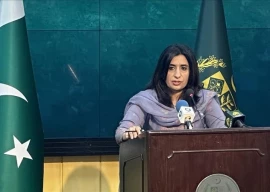
1730379446-0/WhatsApp-Image-2024-10-31-at-17-56-13-(1)1730379446-0-270x192.webp)
1730985983-0/Express-Tribune-Web-(28)1730985983-0-270x192.webp)
1730797335-0/Untitled-design-(81)1730797335-0-270x192.webp)

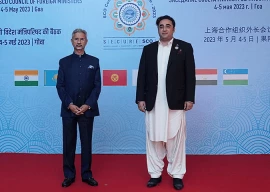
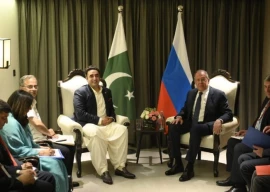

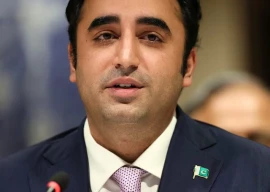






COMMENTS (8)
Comments are moderated and generally will be posted if they are on-topic and not abusive.
For more information, please see our Comments FAQ